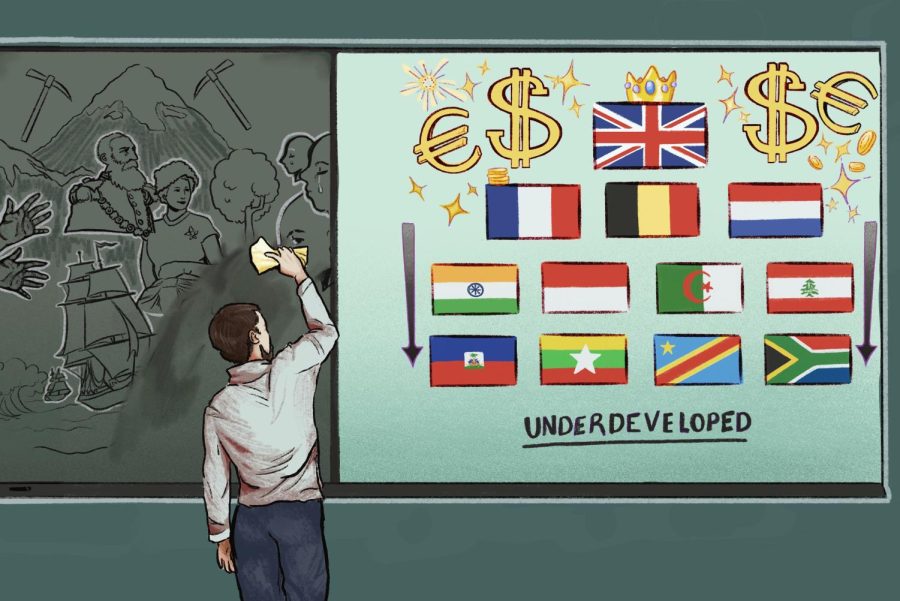Contextualizing colonization in macroeconomics
June 12, 2023
When I took Intro to Macroeconomics at UT, I noticed an alarming gap in class material: the role of colonization in uneven economic growth.
Macroeconomics emerged in the 1930s during the Great Depression. At its core macroeconomics focused on structural parts of the economy, but it centered western countries. Due to its ties to systemic issues, Intro to Macroeconomics at UT must highlight the involvement of imperialism and the ways it still impacts economic progress for many countries today.
“There’s always a background of colonization there, but I don’t think it was explicitly discussed,” said Afif Amin, an economics junior and undergraduate assistant for the spring 2023 Intro to Macroeconomics course.
The lack of clear acknowledgment surrounding imperialism in this course makes it more difficult for students to understand how concepts like gross domestic product fit into their world view.
“In the economics department, we have several upper division courses where issues relating to colonization are relevant,” economics department chair Thomas Wiseman said. “Our Introduction to Macroeconomics course gives students the tools that they need to study those and other issues.”
While it’s impossible to cover all relevant content in an introductory course, it’s vital to clearly emphasize the connection between imperialism and uneven economic growth across nations.
Business students are required to take both Intro to Macroeconomics and Intro to Microeconomics during their freshman year, but many business students likely do not go on to take upper division economics courses because of the prerequisites involved.
Business sophomore Trevin Gatto said that he and his classmates don’t plan on taking upper division economics courses.
“We didn’t really discuss colonization,” Gatto said. “It was more a heavy focus on America and the American economy.”
Business students who don’t take economics courses beyond their degree requirements remain unfamiliar with the role of colonization in financial structures, which is necessary context for understanding how these systems came to be.
While Intro to Macroeconomics is a difficult course and covers a lot of content in just a semester, time can be made to acknowledge the effects of imperialism on national economies.
“I could see a place (in the class) where we have a context for why certain nations’ GDPs are lower than others because obviously imperialism has a lot to do with that,” Amin said.
However, Amin said he understands why the course does not touch on the subject.
“I guess I feel like students are struggling a lot to understand (macroeconomics), and adding a third dimension about how historically this has panned out for multiple countries…I think a lot of the students would be incredibly confused,” Amin said.
At the beginning of the course, it would be more difficult for students to understand the contextualization. However, the GDP and economic growth unit later in the semester is the perfect place to talk about colonization.
The explanation does not need to be long or in-depth, but during the course professors should acknowledge that uneven economic growth was largely driven by imperialism. Otherwise, students are not equipped to understand how economic progress arose and how systemic issues are part of our financial systems today.
Professor James Galbraith, the Lloyd M. Bentsen Jr. chair in government/business relations at LBJ, began to focus on the connection between colonization and economics after reading scholarly work surrounding the origin of capitalism in the Caribbean, a prominent colony. Galbraith discusses the impacts of colonization in his classes because he believes it is important for students to know.
“To teach classes that are relevant to the historical experience of the students who are here now has to be placed in a very prominent position. Otherwise, we’re just trying to sell a picture which is decades out of date,” Galbraith said. “At that point, we simply deny ourselves an ability to understand the world in which we currently live in from the world from which we came into.”
Muthukrishnan is a government and race, indigeneity and migration sophomore from Los Gatos, California.












